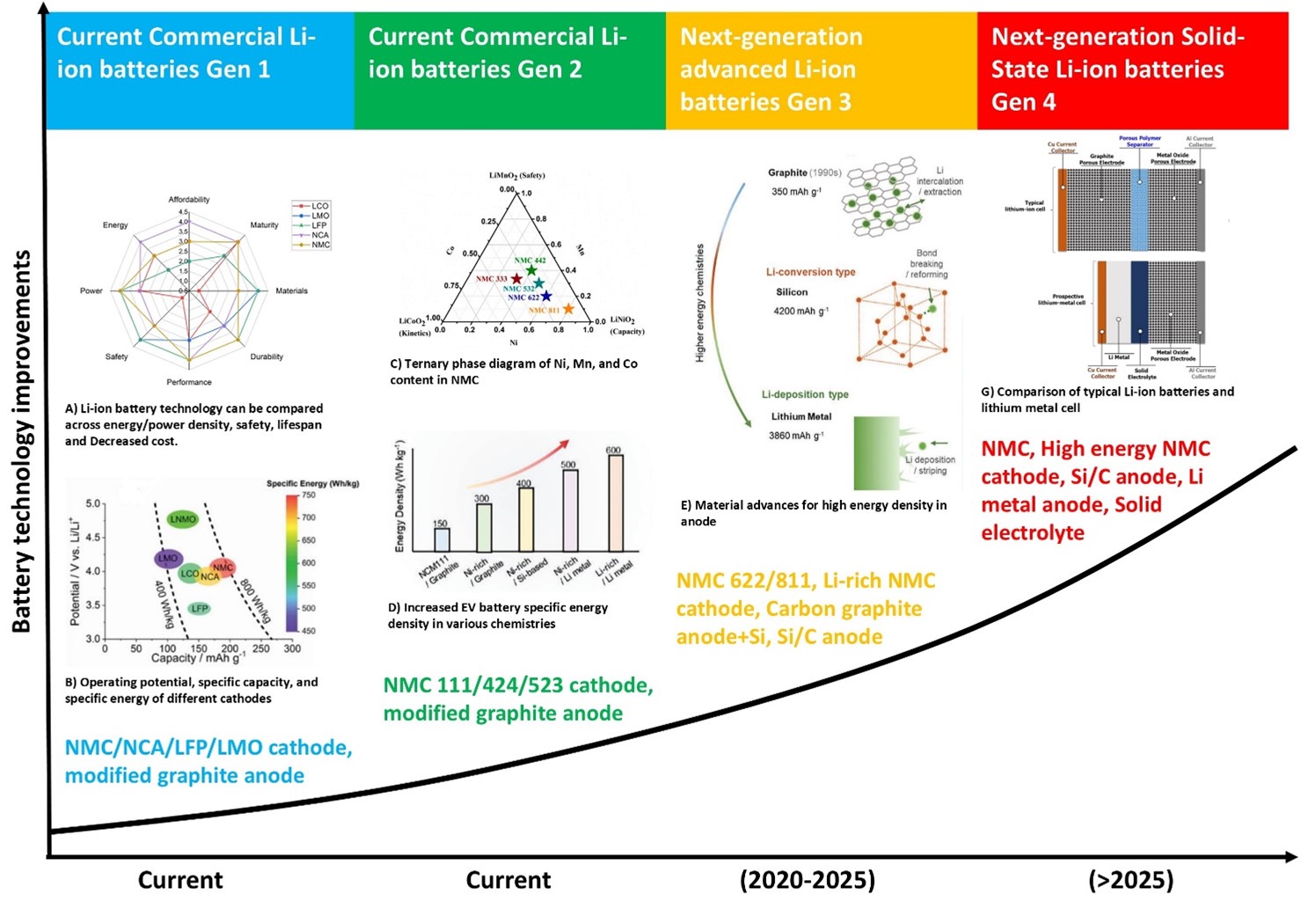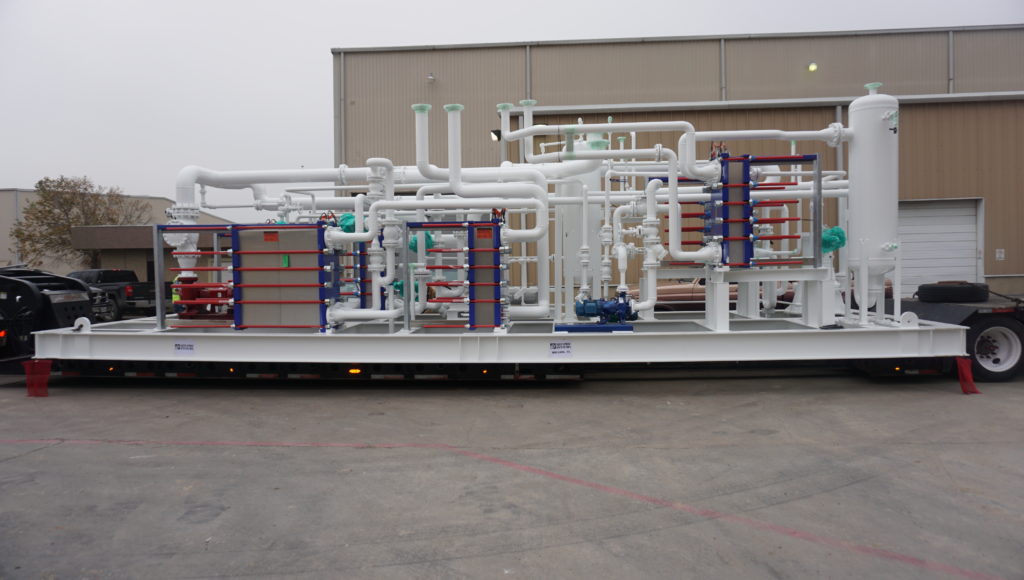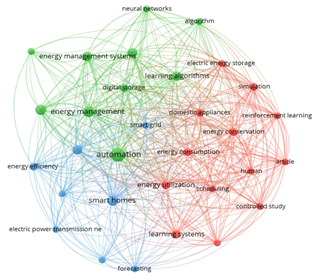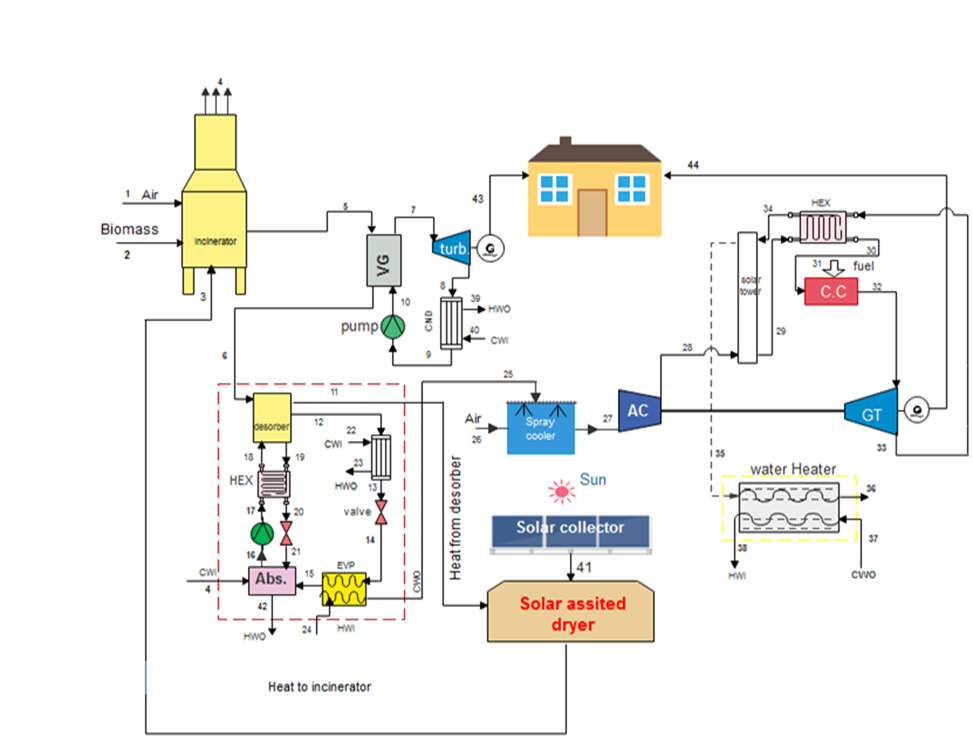The perspective of energy storage systems advancements and challenges for electric vehicle applications; metric, mechanism, mode, and mitigation framework

Downloads
New advancements in the automobile industry require greater demonstration of the role of energy storage in EVs. More effective energy production and storage require an in-depth look at the recent advancements and challenges of energy storage systems (ESS). This paper presents a holistic and hierarchical framework of metric, mechanism, mode, and mitigation of ESSs recent advancements and challenges, including a) Evaluation metrics for advancements, b) Identification of mechanisms and most important challenges, c) Mode and effects analysis, d) Mitigation through material optimization/system design. A comprehensive review was conducted by comparing different batteries, fuel cells, and supercapacitors’ efficiencies, performance, advantages, and disadvantages.
A. Gharehghani et al., “Progress in battery thermal management systems technologies for electric vehicles,” Renewable and Sustainable Energy Reviews, vol. 202, p. 114654, Sep. 2024, doi: 10.1016/j.rser.2024.114654.
J. Zhao et al., “Battery engineering safety technologies (BEST): M5 framework of mechanisms, modes, metrics, modeling, and mitigation,” eTransportation, vol. 22, p. 100364, Dec. 2024, doi: 10.1016/j.etran.2024.100364.
“IEA (2024), Global EV Outlook 2024, IEA, Paris https://www.iea.org/reports/global-ev-outlook-2024, Licence: CC BY 4.0.”
A. Parikh, M. Shah, and M. Prajapati, “Fuelling the sustainable future: a comparative analysis between battery electrical vehicles (BEV) and fuel cell electrical vehicles (FCEV),” Environ Sci Pollut Res, vol. 30, no. 20, pp. 57236–57252, Apr. 2023, doi: 10.1007/s11356-023-26241-9.
S. Sabihuddin, A. E. Kiprakis, and M. Mueller, “A numerical and graphical review of energy storage technologies,” Energies, vol. 8, no. 1, pp. 172–216, 2014.
M. Yaseen et al., “A review of supercapacitors: materials design, modification, and applications,” Energies, vol. 14, no. 22, p. 7779, 2021.
Y. Wang, X. Feng, W. Huang, X. He, L. Wang, and M. Ouyang, “Challenges and Opportunities to Mitigate the Catastrophic Thermal Runaway of High-Energy Batteries,” Advanced Energy Materials, vol. 13, no. 15, p. 2203841, 2023, doi: 10.1002/aenm.202203841.
I. Banagar, A. Mahmoudzadeh Andwari, S. Mehranfar, J. Könnö, and E. Kurvinen, “Electric vehicles’ powertrain systems architectures design complexity,” 2023, Accessed: Oct. 28, 2024. [Online]. Available: https://oulurepo.oulu.fi/handle/10024/44739
S. Rashidi, N. Karimi, B. Sunden, K. C. Kim, A. G. Olabi, and O. Mahian, “Progress and challenges on the thermal management of electrochemical energy conversion and storage technologies: Fuel cells, electrolysers, and supercapacitors,” Progress in Energy and Combustion Science, vol. 88, p. 100966, 2022.
M. S. Houache, C.-H. Yim, Z. Karkar, and Y. Abu-Lebdeh, “On the current and future outlook of battery chemistries for electric vehicles—mini review,” Batteries, vol. 8, no. 7, p. 70, 2022.
Bin Ahmad MS, Pesyridis A, Sphicas P, Mahmoudzadeh Andwari A, Gharehghani A, Vaglieco BM. Electric vehicle modelling for future technology and market penetration analysis. Front Mech Eng 2022;8:896547. https://doi.org/10.3389/ fmech.2022.896547.
E. Chemali, M. Preindl, P. Malysz, and A. Emadi, “Electrochemical and electrostatic energy storage and management systems for electric drive vehicles: State-of-the-art review and future trends,” IEEE Journal of Emerging and Selected Topics in Power Electronics, vol. 4, no. 3, pp. 1117–1134, 2016.
M. Rabiei, A. Gharehghani, A.M. Andwari, Enhancement of battery thermal management system using a novel structure of hybrid liquid cold plate, Appl. Therm. Eng. 232 (2023), 121051. https://doi.org/10.1016/j.est.2023.110273.
M. B. F. Ahsan, S. Mekhilef, T. K. Soon, M. B. Mubin, P. Shrivastava, and M. Seyedmahmoudian, “Lithium‐ion battery and supercapacitor‐based hybrid energy storage system for electric vehicle applications: A review,” Intl J of Energy Research, vol. 46, no. 14, pp. 19826–19854, Nov. 2022, doi: 10.1002/er.8439.
C.-Y. Wang et al., “Fast charging of energy-dense lithium-ion batteries,” Nature, vol. 611, no. 7936, pp. 485–490, 2022.
“Breaking Down the Cost of an EV Battery Cell. Available online: https://elements.visualcapitalist.com/breaking-down-the-cost-of-an-ev-battery-cell/”.
A. Cardenas, C. Guzman, and W. Martinez, “Ev overnight charging strategy in residential sector: Case of winter season in quebec,” Vehicles, vol. 3, no. 3, pp. 557–577, 2021.
Y. Liu, Y. Zhu, and Y. Cui, “Challenges and opportunities towards fast-charging battery materials,” Nature Energy, vol. 4, no. 7, pp. 540–550, 2019.
M. Shahjalal et al., “A review on second-life of Li-ion batteries: Prospects, challenges, and issues,” Energy, vol. 241, p. 122881, 2022.
C. Chellaswamy and R. Ramesh, “Future renewable energy option for recharging full electric vehicles,” Renewable and Sustainable Energy Reviews, vol. 76, pp. 824–838, Sep. 2017, doi: 10.1016/j.rser.2017.03.032.
P. Forouzandeh, V. Kumaravel, and S. C. Pillai, “Electrode materials for supercapacitors: a review of recent advances,” Catalysts, vol. 10, no. 9, p. 969, 2020.
S. Samantaray, D. Mohanty, I.-M. Hung, M. Moniruzzaman, and S. K. Satpathy, “Unleashing recent electrolyte materials for next-generation supercapacitor applications: a comprehensive review,” Journal of Energy Storage, vol. 72, p. 108352, 2023.
M. İnci, M. Büyük, M. H. Demir, and G. İlbey, “A review and research on fuel cell electric vehicles: Topologies, power electronic converters, energy management methods, technical challenges, marketing and future aspects,” Renewable and Sustainable Energy Reviews, vol. 137, p. 110648, 2021.
“Modern Electric, Hybrid Electric, and Fuel Cell Vehicles | Mehrdad Ehs.” Accessed: Oct. 28, 2024. [Online]. Available: https://www.taylorfrancis.com/books/mono/10.1201/9780429504884/modern-electric-hybrid-electric-fuel-cell-vehicles-mehrdad-ehsani-yimin-gao-stefano-longo-kambiz-ebrahimi
Remzi Can Samsun, Laurent Antoni, Michael Rex, Detlef Stolten, “Deployment Status of Fuel Cells in Road Transport: 2021 Update.”
R. C. Samsun, M. Rex, L. Antoni, and D. Stolten, “Deployment of fuel cell vehicles and hydrogen refueling station infrastructure: a global overview and perspectives,” Energies, vol. 15, no. 14, p. 4975, 2022.
S. Ma et al., “Fuel cell-battery hybrid systems for mobility and off-grid applications: A review,” Renewable and Sustainable Energy Reviews, vol. 135, p. 110119, 2021.
C. Li et al., “Fe-NC PGM-Free ORR Catalysts: An Investigation of the Source of Observed Redox Peaks and Their Significance to Catalysis,” in ECS Meeting Abstracts, 2022, pp. 1487–1487. Accessed: Oct. 28, 2024. [Online]. Available: https://ui.adsabs.harvard.edu/abs/2022ECSMA2022.1487L/abstract
C. Li et al., “Rationally Designed PGM-Free Catalyst MEA with Extraordinary Performance,” in Electrochemical Society Meeting Abstracts 242, The Electrochemical Society, Inc., 2022, pp. 1487–1487. Accessed: Oct. 28, 2024. [Online]. Available: https://iopscience.iop.org/article/10.1149/MA2022-02401487mtgabs/meta
P. Larpruenrudee, N. S. Bennett, Y. Gu, R. Fitch, and M. S. Islam, “Design optimization of a magnesium-based metal hydride hydrogen energy storage system,” Scientific Reports, vol. 12, no. 1, p. 13436, 2022.
B. D. James, J. M. Huya-Kouadio, C. Houchins, and D. A. DeSantis, “Mass production cost estimation of direct H2 PEM fuel cell systems for transportation applications: 2012 update,” report by Strategic Analysis, Inc., under Award Number DEEE0005236 for the US Department of Energy, vol. 18, 2012, Accessed: Oct. 28, 2024. [Online]. Available: https://www.researchgate.net/profile/Brian-James-5/publication/341407810_Final_SA_2018_Transportation_Fuel_Cell_Cost_Analysis_-2020-01-23/links/5ebea64ba6fdcc90d675d7b4/Final-SA-2018-Transportation-Fuel-Cell-Cost-Analysis-2020-01-23.pdf
S. T. Thompson et al., “Direct hydrogen fuel cell electric vehicle cost analysis: System and high-volume manufacturing description, validation, and outlook,” Journal of Power Sources, vol. 399, pp. 304–313, 2018.
“IEA (2015), Technology Roadmap - Hydrogen and Fuel Cells, IEA, Paris.” [Online]. Available: https://www.iea.org/reports/technology-roadmap-hydrogen-and-fuel-cells, License: CC BY 4.0. n.d
“IEA (2021), Global EV Outlook 2021, IEA, Paris.” [Online]. Available: https://www.iea.org/reports/global-ev-outlook-2021, License: CC BY 4.0 n.d.














